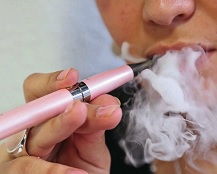Vaping is over 95% safer than smoking, but most people don't know it. If we give smokers accurate information, they're more likely to choose harm reduction. So why aren't more people telling the truth about vaping?
New research published in the FASEB Journal has found that smoking cigarettes disrupts the body’s internal clock in both the brain and lungs, leading to a decrease in overall activity and disturbance of the sleep cycle in the mice studied.
A new study actually asked the questions that need to be asked to work out if e-cigarettes are a gateway to cigarettes, and (surprise, surprise) found no evidence of a gateway effect from vaping.
According to a new study, minors can “easily” buy e-cigarettes online – provided they’re happy to lie about their age and are in possession of a credit card – so the authors argue that adult vapers shouldn’t be able to receive deliveries. The authors found that 94 percent of purchase attempts made by minors, that weren't thwarted by apparent website errors rather than age verification issues, were successful.
In a new study, the profound level of public misunderstanding about tobacco harm reduction products like chewing tobacco, snus and e-cigarettes has been revealed. Among other findings, the study suggests that around half of those who’ve heard about e-cigarettes believe them to be either as harmful as smoking or even more so.
A new study published in Lancet from researchers in New Zealand has pitted e-cigarettes against patches to see which approach is more effective.
A new study from Dr. Konstantinos Farsalinos compares nicotine delivery from first generation e-cigs and newer electronic cigarette devices.
A recent French study concludes that e-cigs are potentially carcinogenic. To find out what they actually determined from the test, it’s very, very important to look what they did to come to their conclusion. The answer would literally melt your face off.
Passive vapor may be no more harmful (and probably way better smelling) than smoke and vapor-free human breath and even outdoor air.
A paper from Dr. Konstantinos Farsalinos and Prof. Gerry Stimson tackles the question of whether medical regulation for electronic cigarettes is justified.
The cancer risk associated with formaldehyde consumption from long-term high-voltage vaping is 5 to 15 times greater than the formaldehyde-related risk from long-term pack-a-day smoking, according to a new study published in the New England Journal of Medicine. However, when you look more closely, the finding isn't quite what it seems.
A new piece of research has been released suggesting that the primary benefit of e-cigarettes, that they help people quit smoking, isn’t true when it comes to cancer patients.
Nicotine replacement therapy (NRT) isn’t as benign as Big Pharma wants you to believe. They may have suckered politicians, doctors and scientists into supporting their trade in an addictive drug, but with my powers of cherry-picking, misrepresentation and lies of omission, I can reveal the truth: NRT is a serious threat to public health.
It shouldn't come as a surprise that a recent study found that teenagers are using e-cigarettes to vape pot. The headline finding is that almost one in five teens who’d tried vaping e-liquid had also tried vaping marijuana, but – as always – such an opportunity couldn’t be allowed to pass by without attempting to blame e-cigarettes for what happened. So, are e-cigarettes a gateway to marijuana now?
A new pre-clinical study presented at a conference last month suggests that human lung cells with mutations associated with a high cancer risk exhibit more “cancerous behaviors” after being exposed to e-cigarette vapor.
A new study looking at the factors associated with switching from cigalike e-cigarettes to advanced devices has provided more evidence that newer-generation devices are more effective when it comes to quitting smoking, and confirms what most vapers know: advanced devices are just better all round.
A new study from Professor Riccardo Polosa has found that second-generation e-cigarettes are effective for helping smokers quit. Two-thirds of the smokers studied, who had no intention of quitting, either stopped smoking entirely or reduced their daily smoking by at least half after starting vaping.
For those intent on claiming that e-cigs are a gateway to conventional cigarettes, the new Monitoring the Future study has a pretty devastating result: it turns out, most teen vapers don’t even use nicotine.
The New England Journal of Medicine formaldehyde study made a lot of people scared about formaldehyde in e-cig vapor. The research was heavily criticized, but the authors brushed off issues as "speculation." They can't do that anymore. Now yet another peer-reviewed study has clearly demonstrated that the original study's method was massively flawed.
A new study being touted as evidence that vaping is a gateway to smoking really only shows that "teens who experiment continue to experiment," and actually provides a pretty solid blueprint for showing vaping is a gateway to anything you want. Here's how to design a study to "support" whatever gateway claim you like.




















